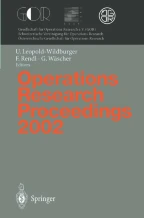Abstract
Equipment-intensive industries such as airlines, nuclear power plants, various process and manufacturing plants using complex machineries are often confronted with the difficult task of maintaining a high system performance while controlling their inventory holding cost. An important type of components in such industries are called repairable items. The typical problem is to determine the optimal stocking level of spare parts. An insufficient stock of spare parts can lead to an excessive downtime cost. On the other hand, maintaining an excessive number of spare parts increases the cost of tying up capital in non-revenue-generating spare parts inventories.
Access this chapter
Tax calculation will be finalised at checkout
Purchases are for personal use only
Preview
Unable to display preview. Download preview PDF.
Similar content being viewed by others
References
Alfredsson P, Verrijdt J (1999) Modeling emergency supply flexibility in a two-echelon inventory system. Management Science 45: 1416-1431
Anupindi R, Bassok Y, Zemel E (1999) Study of decentralized distribution systems: part I - general framework. Working paper, Kellog Graduate School of Management, Northwestern University, Evanston, IL
Anupindi R, Bassok Y, Zemel E (1999) Study of decentralized distribution systems: part II - applications. Working paper, Kellog Graduate School of Management, Northwestern University, Evanston, IL
Axsater S (1990) Modelling emergency lateral transshipments in inventory systems. Management Science 36: 1329-1338
Gerchak Y, Gupta D (1991) On apportioning costs to customers in centralized continuous review inventory systems. Journal of operations Management 10: 546-551
Grahovac J, Chakravarty A (2001) Sharing and lateral transshipment of inventory in a supply chain with expensive low-demand items. Management Science 47: 579-594
Kukreja A, Schmidt CP, Miller DM (2001) Stocking decisions for low-usage items in a multilocation inventory system. Management Science 47: 1371-1383
Lee HL (1987) A multi-echelon inventory model for repairable items with emergency lateral transshipments. Management Science 33: 1302-1316
Lippman SA, McCardle KF (1997) The competitive newsboy. Operations Research 45: 54-65
Parlar M (1988) Game theoretic analysis of the substitutable product inventory problem with random demands. Naval Research Logistics 35: 397-409
Robinson LW (1993) A comment on Gerchak and Gupta’s “On apportioning costs to customers in centralized continuous review inventory systems ”. Journal of Operations Management II: 99-102
Rudi N, Kapur S, Pyke DF (2001) A two-location inventory model with transshipment and local decision making. Management Science 47: 1668-1680
Sherbrooke CC (1968) METRIC: A multi-echelon technique for recoverable item control. Operations Research 16: 122-141
Sherbrooke CC (1992) Multi-echelon inventory systems with lateral supply. Naval Research Logistics 39: 29-40
Tagaras G (1999) Pooling in multi-location periodic inventory distribution systems. Omega International Journal of Management Science 27: 39-59
Tagaras G, Cohen MA (1992) Pooling in two-location inventory systems with nonnegligible replenishment lead times. Management Science 38: 1067-1083
Wang Q, Parlar M (1994) A three-person game theory model arising in stochastic inventory control theory. European Journal of Operational Research 76: 83-97
Yanagi S, Sasaki M (1992) An approximation method for the problem of a repairableitem inventory system with lateral supply. IMA Journal of Mathematics Applied in Business and Industry 3: 305-314.
Author information
Authors and Affiliations
Editor information
Editors and Affiliations
Rights and permissions
Copyright information
© 2003 Springer-Verlag Berlin Heidelberg
About this paper
Cite this paper
Wong, H., Cattrysse, D., Van Oudheusden, D. (2003). Modeling the Interaction between Operational and Financial Decisions in the Inventory Pooling of Repairable Spare Parts Problem. In: Leopold-Wildburger, U., Rendl, F., Wäscher, G. (eds) Operations Research Proceedings 2002. Operations Research Proceedings 2002, vol 2002. Springer, Berlin, Heidelberg. https://doi.org/10.1007/978-3-642-55537-4_19
Download citation
DOI: https://doi.org/10.1007/978-3-642-55537-4_19
Publisher Name: Springer, Berlin, Heidelberg
Print ISBN: 978-3-540-00387-8
Online ISBN: 978-3-642-55537-4
eBook Packages: Springer Book Archive
